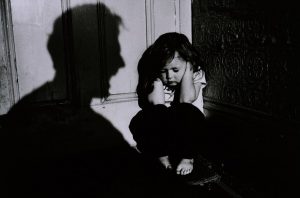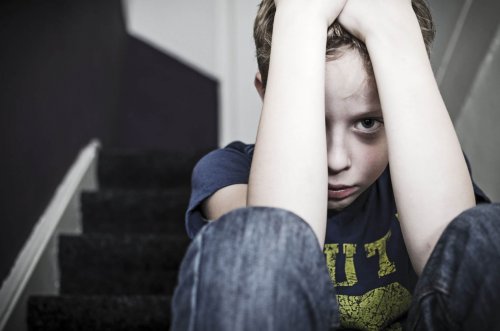How to Respond to Those Who Think It's Necessary to Hit Children

How should you respond to those who think it’s necessary to hit children? How do you justify why you don’t agree with corporal punishment?
Conversations often lend themselves to sharing ideas about early childhood education and parenting methods.
In the face of those parents or relatives who think that hitting is the best option to educate, you should know how to say that you don’t agree.
The truth is that, if we choose violence, we’ll always be on the wrong path.
A great lesson that you can teach your children is that violent behaviors shouldn’t be justified under any circumstances.
Self-control and good arguments are the most effective means to avoid conflict and provide a real solution to problems. It isn’t necessary to mistreat others in order to prove ourselves.
Stop for a moment to think about it. Are you better if you hit someone? The answer is NO. Nor will you EVER be.
Anyone who preaches otherwise only demonstrates vulnerability and insecurity so great that it’s necessary to resort to brute force, that primitive and unintelligent resource.
Perhaps you’ve often heard another parent talk about how “effective” it is to spank or slap their children.
As shocking as it may seem, many times when we compare ourselves with other parents, we can end up imitating their violence and develop it in our own home, believing that this way we gain more respect and impose more discipline on our children.
It is clear that the way to heal society of violence and lack of love is to replace the pyramid of domination with the circle of equality and respect.
-Manitonquat-
The following are some important reasons you can use to appeal to others if you don’t agree with the use of physical punishment.
Consequences of corporal punishment in childhood
- Deficiencies in emotional development. A child who receives severe physical and emotional punishments has lower self-esteem, a poor attention span, difficulties in relating to others in society, anxiety and depression.
- Approval of physical abuse as an interaction model. Violent behaviors tend to repeat themselves. This is why a child who has been physically abused is more likely to become a perpetrator of abuse against other people.
- It increases the levels of irritability and aggressiveness. Children aren’t old enough to distinguish the difference between the unacceptable behavior that the parent seeks to repress and the violent means by which he or she does so. In the short term, this contradiction becomes a trigger for aggression.
- Corporal punishment goes against the process of developing ethics and values. When a parent demands that his or her children behave properly, the fact that they obey and interact in a healthy way and yet also punish them physically creates internal conflict in the child.
On the one hand they’re judged by unacceptable behavior, but the punishment used is even less acceptable.

How to respond to those who think it’s necessary to hit children
- Hitting children is not a behavior that sets a good example. When you hit them, they learn to hit, especially if they’re small and don’t yet know many social commands that need to be met.
- Children tend to imitate the behaviors of the people they love and respect. They believe that what you do is right. It’s likely that your behavior is the same behavior they’ll use with other children.
- Hitting doesn’t correct inappropriate behavior. In many cases, the behaviors that a parent disapproves of become recurrent when there is abuse. A child who receives negative physical feedback feels bad inside and reflects it by acting in a more reprehensible way.
- Physically violent interaction promotes anger in children and parents. Although children apparently act in the expected way after physical punishment, the negative emotions within them become a time bomb. In a moment of excessive anger, it’s possible for the parent to use excessive physical strength on a child, and this is something that is recorded in his emotional memory.
In summary
- Physical punishment detracts from the child. A child’s self-image is generated by how he feels others perceive him. No matter how hard you try to make your child feel that you love him, if you hit him, you’ll be sending a confusing message. Slaps and spanks make children feel that they are weak and helpless, that anyone can violate them.
- Corporal punishment detracts from the parent. It takes away from the parent’s relationship with his or her children. It puts great distance between them because it generates very strong emotional barriers and tension when communicating.
All cited sources were thoroughly reviewed by our team to ensure their quality, reliability, currency, and validity. The bibliography of this article was considered reliable and of academic or scientific accuracy.
- Escrivá, M. V. M., García, P. S., Porcar, A. M. T., & Díez, I. (2001). Estilos de crianza y desarrollo prosocial de los hijos. Revista de psicología general y aplicada: Revista de la Federación Española de Asociaciones de Psicología, 54(4), 691-703. https://dialnet.unirioja.es/descarga/articulo/2364995.pdf
- Rangel, J. V. (2003). Estilos de crianza, estilos educativos y socialización:¿ Fuentes de bienestar psicológico?. Acción pedagógica, 12(1), 48-55. https://dialnet.unirioja.es/servlet/articulo?codigo=2972859
- Jorge, E., & González, M. C. (2017). Estilos de crianza parental: una revisión teórica. Informes Psicológicos, 17(2), 39-66. https://dialnet.unirioja.es/servlet/articulo?codigo=7044268
- Mestre, M. V., Tur, A. M., Samper, P., Nácher, M. J., & Cortés, M. T. (2007). Estilos de crianza en la adolescencia y su relación con el comportamiento prosocial. Revista latinoamericana de psicología, 39(2), 211-225. https://www.redalyc.org/pdf/805/80539201.pdf
- Rojas, M. (2015). Felicidad y estilos de crianza parental. Documento de Trabajo). México: Centro de Estudios Espinosa Yglesias. https://ceey.org.mx/wp-content/uploads/2018/06/16-Rojas-2015.pdf
This text is provided for informational purposes only and does not replace consultation with a professional. If in doubt, consult your specialist.
